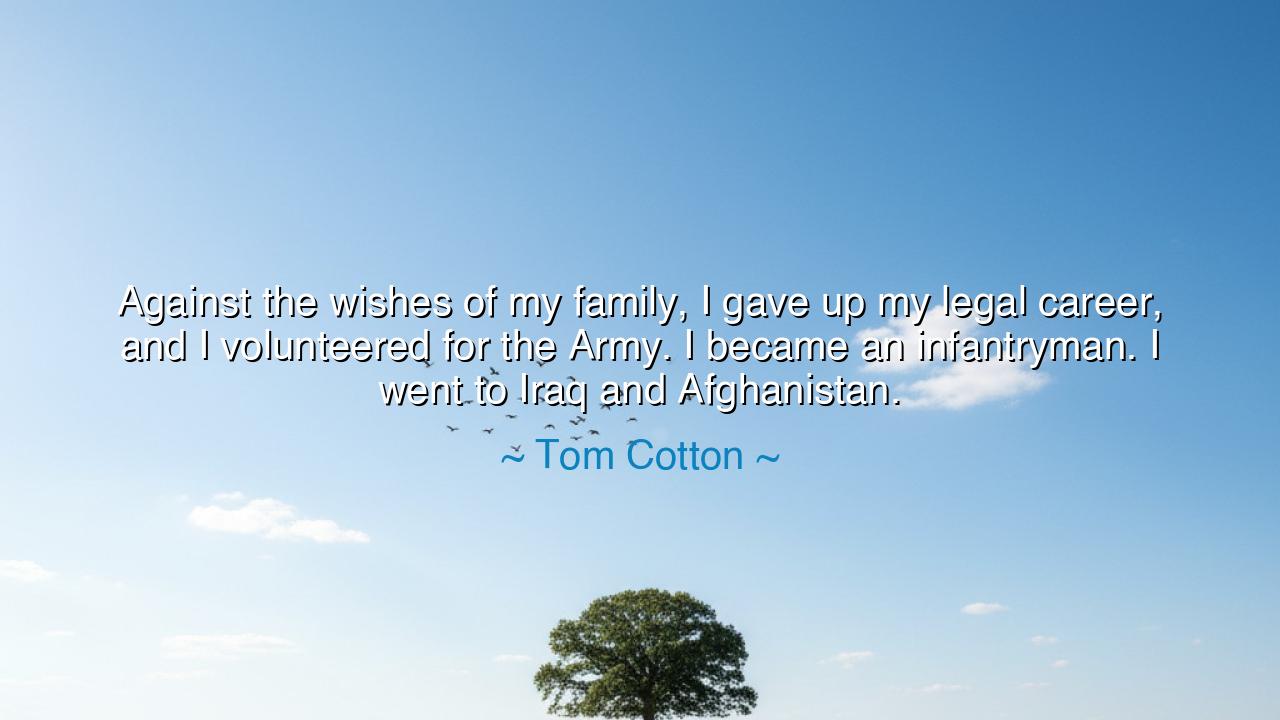
Against the wishes of my family, I gave up my legal career, and I
Against the wishes of my family, I gave up my legal career, and I volunteered for the Army. I became an infantryman. I went to Iraq and Afghanistan.






The words of Tom Cotton, “Against the wishes of my family, I gave up my legal career, and I volunteered for the Army. I became an infantryman. I went to Iraq and Afghanistan,” stand as a testament to sacrifice, duty, and conviction. They speak of the moment when a man turns away from comfort and prestige to embrace hardship for a greater cause. In this declaration, there is both quiet defiance and noble purpose — the voice of one who chose the harder path, not for glory, but for service. Cotton’s decision to abandon the law for the sword reveals the timeless struggle between the life of the mind and the call of the spirit — between security and honor. His words remind us that true greatness often demands the courage to disappoint those we love in order to serve something greater than ourselves.
The origin of this quote lies in Cotton’s own life story, when as a young Harvard-educated lawyer, he left behind the promise of wealth and prestige to join the United States Army in the wake of September 11, 2001. His family, understandably fearful, urged him to remain in safety — for what sense could there be in trading the courts of law for the battlefields of Iraq and Afghanistan, where death walked openly and the future was uncertain? But Cotton’s heart was moved by conviction. He believed that the defense of liberty was not the burden of others alone, but the duty of every free citizen. Thus, he chose the path of service, forsaking his rising career for the discipline of the infantry, and in doing so, he became part of the long lineage of those who have placed country above comfort and principle above peace.
In this, Cotton’s decision mirrors the ancient ideal of virtus — the Roman concept of moral courage and duty to the Republic. For the Romans, the man of virtue was not one who sought ease, but one who accepted burden for the sake of the whole. Just as the young Cincinnatus, when his city was threatened, left his plow to lead Rome’s armies and returned to his farm when the danger had passed, so too did Cotton lay aside the tools of his trade to take up arms. Such actions remind us that civilization is built and defended not only by words and laws, but by those willing to stand in the breach when words fail and danger looms. His journey from legal scholar to soldier is the living echo of that ancient truth: that freedom is preserved not by intellect alone, but by sacrifice and service.
To understand the deeper meaning of his choice, one must see beyond the surface of profession and into the heart of duty. The law represents order, reason, and the pursuit of justice within the bounds of civilization. The army, by contrast, stands as its shield — the force that protects those bounds from being shattered by chaos. By leaving his legal career, Cotton crossed from the domain of theory into the realm of action, from the defense of justice through words to the defense of justice through deeds. His decision embodies the truth that justice, however noble, cannot survive without the courage of those willing to fight for it. The law gives life structure, but valor gives it endurance.
History is rich with such examples. Consider the story of Mahatma Gandhi’s son, Harilal, who, though born into privilege and educated for a life of law and leadership, struggled to reconcile the comfort of personal ambition with the sacrifice demanded by his father’s vision of national service. Where Harilal faltered, Cotton chose firmly — surrendering personal ambition for a duty he believed sacred. His act resonates with the same spirit that drove the philosopher Pericles to fight for Athens, the scholar-warrior Marcus Aurelius to lead Rome’s legions, and countless unnamed souls to step forward when their nations called. It is a reminder that greatness is rarely born in comfort — it is forged in hardship, in the willingness to serve when easier paths beckon.
In the tone of Cotton’s words, one hears not pride, but conviction — the conviction that freedom demands the living participation of those it protects. To go “against the wishes of my family” is no small thing; it is to bear the pain of love tested by duty. But this pain, too, is part of honor. The one who serves must sometimes walk alone, carrying both the burden of service and the sorrow of separation. Yet such solitude is the price of purpose. The ancients taught that every noble act requires sacrifice — that the hero is not born in triumph, but in the courage to stand firm in the face of misunderstanding and fear.
Let the lesson of Tom Cotton’s words be passed down as a call to all who seek meaning in their lives: that comfort is fleeting, but service endures. The pursuit of greatness in the eyes of the world — through career, status, or wealth — is small beside the greatness of living for something larger than oneself. Whether one’s battlefield lies in war, justice, or compassion, the same truth holds: to give up comfort for duty is to give up nothing at all, but to gain everything that makes life noble. So, when the call of conscience comes — whether to defend your nation, your neighbor, or your principles — do not ignore it. For it is in that moment of choice, when comfort is abandoned for conviction, that the soul steps into the light of immortality.






AAdministratorAdministrator
Welcome, honored guests. Please leave a comment, we will respond soon